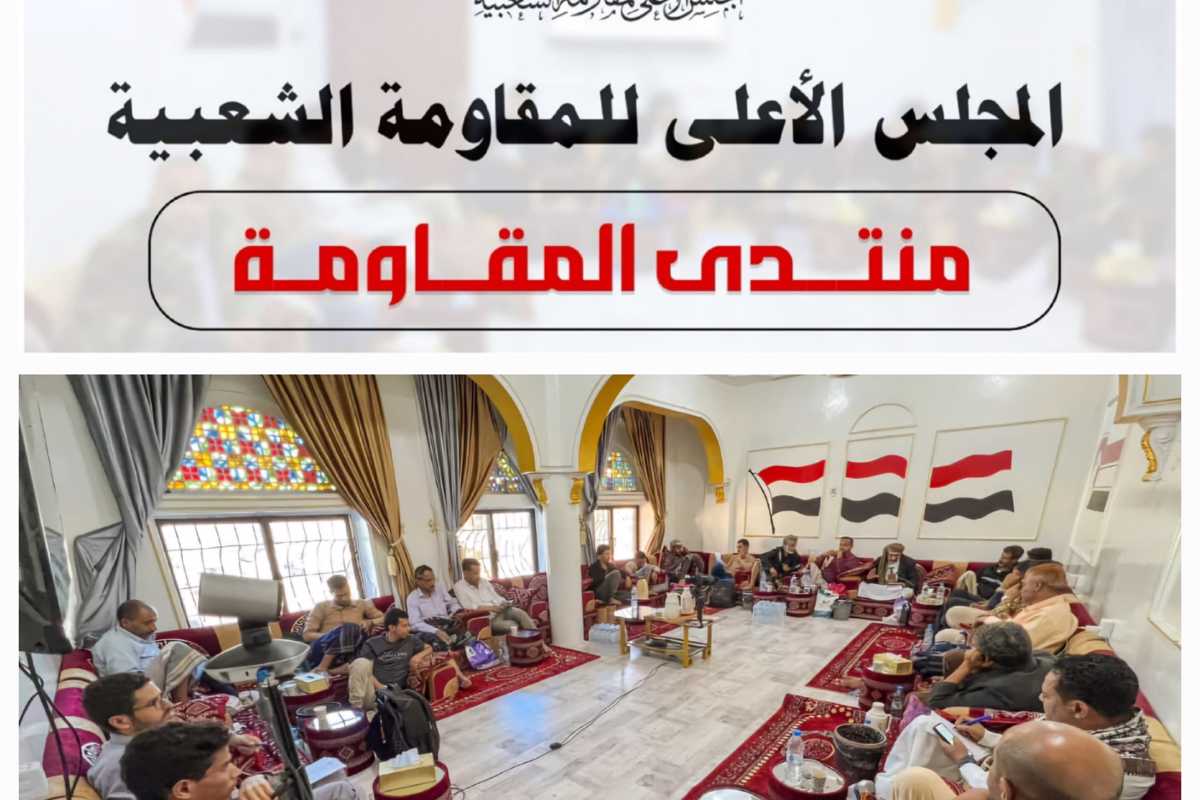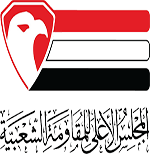Politicians and Researchers in Taiz: A Military Resolution Is the Inevitable Option to End the Coup, and the Opportunity Is Now
2025-04-29
Media Department - Exclusive
The city of Taiz hosted an intellectual event organized by the Weekly Forum of the Popular Resistance. The event discussed the latest developments in the national scene and future scenarios in light of developments on the local and regional scene. The event emphasized that a military resolution is the inevitable option to end the coup, and that local and regional conditions are currently favorable.
The Weekly Forum of the Popular Resistance was held at the headquarters of the Council's General Secretariat in Taiz, under the title: "The Supreme Council of the Popular Resistance and the Priorities of the Liberation Battle." A group of academics, resistance fighters, and activists participated in the event. It included three main papers, divided between an analytical reading of the current situation and potential scenarios, an emphasis on the pivotal role of the popular resistance in the liberation battle, and a practical vision for the Supreme Council of the Resistance regarding the requirements of the next phase.
In the first paper, University Professor Abdo Mohammed Al-Raimi analyzed the current situation in Yemen, the most prominent local and regional transformations and their repercussions on the Yemeni scene, and the possible scenarios for the next phase.
Al-Raimi stated that the Yemeni reality is rife with crises. In addition to the ongoing war sparked by the coup plotters for ten years, Yemenis are experiencing profound hardship. The economic war and the ongoing collapse of the local currency have had a profound impact on the lives of citizens. He added that the ongoing conflict and political fragmentation have negatively impacted the lives of Yemenis and hindered the completion of the liberation battle.
He discussed possible scenarios for the next phase in light of local, regional, and international developments, including the US strikes, the recent meetings in Saudi Arabia, and, prior to that, the visit of the Saudi Minister of Defense and the Kingdom's ambassador to Yemen to Tehran, as well as the meeting of the President of the Presidential Council with leaders of various Yemeni parties.
Dr. Al-Raimi pointed out that the scenario of completing the liberation has become more likely, and that Yemenis must take advantage of the available circumstances and opportunities, without relying on external influence. He called on political components and Yemenis in general to learn the lessons well and live up to their national responsibility, while working to unify ranks against the Houthis and all those who harm Yemen. He emphasized that liberating Sana'a is the only guarantee for ending the current crises and tragedies, achieving security and stability, and preserving Yemen's unity and territorial integrity.
In the second paper, presented by activist and poet Ahmed Abu Al-Nasr, a poet from the National Army and the Popular Resistance, he addressed the pivotal role of the popular resistance.
Abu Al-Nasr stated that the popular resistance is not a reaction or a rash act, but rather a deeply rooted idea and a national project that represents the popular will. It is the best way to complete the liberation battle and end the Houthi coup.
He added that the presence of the popular resistance alongside the national army is an urgent necessity. The resistance must be at the forefront of the battle, just as it was the first to break the Houthi expansion, standing as a solid barrier in its path, and exposing the falsity of its project. He emphasized that the country will only be liberated through popular resistance, as it possesses free decision-making.
Abu Al-Nasr pointed out that the Houthi militia is a weak gang that only fights against twenty mines. If the decisive battles for liberation are launched and the heroes of the national army and the popular resistance cross the mined lines, cities and governorates will fall, especially since Yemenis in the areas controlled by the militia have grown fed up with them and are awaiting the approach of the decisive battle and salvation.
In the third paper, presented by Professor Abdul Hadi Al-Azizi, a member of the political body of the Supreme Council of the Popular Resistance, he discussed the priorities of the Supreme Council of the Popular Resistance during the next phase and presented a comprehensive vision for strengthening national performance during this critical stage.
Al-Azazi said that the popular resistance's options are open to all paths, and that they are more numerous than the authorities'. However, the popular resistance does not want to position itself as an alternative to the authorities, as long as the authorities exist and their brute force is formed from the popular resistance. He added that the authorities must direct the national army to take action, and the popular resistance will stand alongside it at the forefront of the national battle.
The member of the political body explained that the Supreme Council of the Popular Resistance expresses and represents the popular will, and therefore must work to mobilize, organize, and promote the culture of resistance among the people, bringing it back to the forefront in preparation for the battle of salvation.
Al-Azazi emphasized that talk of political solutions with the Houthi militia is merely chasing the wind, and that if such a solution were possible, it would have been possible in 2014. He pointed out that political engagement with Hezbollah has been fruitless, but has actually harmed and weakened Lebanon. He also noted that any talk of treaties and agreements is simply a waste of time, because treaties and agreements do not grant homelands, and if they did, they would have been granted to the Palestinians. He emphasized that the solution lies in a decisive military solution, and that the current circumstances are ripe and should be exploited.
The forum concluded with rich contributions, in which attendees offered various visions and proposals to strengthen unity, develop the performance of the popular resistance in various fields, and move from the diagnostic phase to the phase of effective and practical action. They emphasized that the battle for liberation is no longer a deferred dream, but rather a national imperative knocking on the door.
